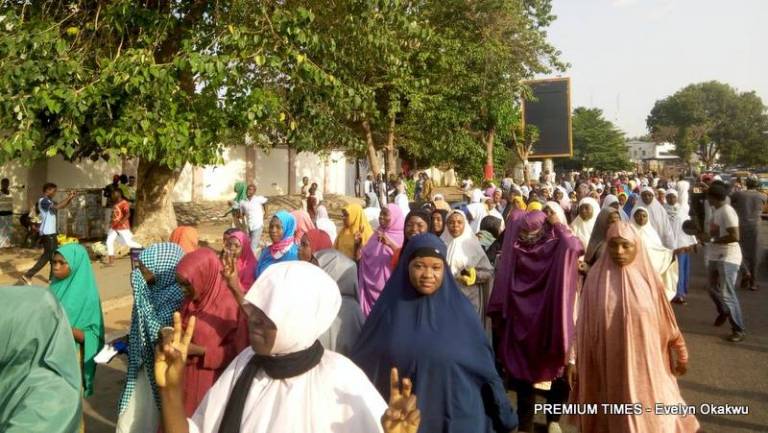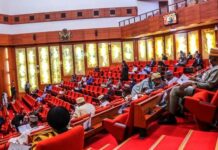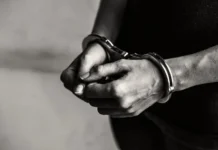How Nigerian Gov’t infringed on Islamic Group’s right to assembly amid extrajudicial killings
Shortly after Juma’at prayers on 14 April 2023, Umar Usman, 65, received a phone call that shook everyone in his family.
His son, 19-year-old Yakubu Umar, had been shot by the police during the Quds Day procession in Abuja, the voice on the phone told him.
Later that day, Mr Usman’s family received Yakubu’s corpse.
“I couldn’t cry immediately until the next morning when they started praying for his corpse,” Narjis, the deceased’s sister, narrated at their home in Suleja, Niger State.
Mr Usman said he was at peace with the tragic incident as he believes Yakubu died a martyr.
According to _Premium Times Nigeria_, earlier that day, Yakubu had joined other members of the Islamic Movement in Nigeria (IMN), reputed as the largest organisation of Shia Muslims in Nigeria, for a planned procession to commemorate the Quds Day in the Wuse area of the nation’s capital.
Many Shia Muslims across the globe commemorate Quds Day on the last Friday of Ramadan to express support for Palestine in its conflict with Israel.
The police started picking up persons suspected to be members of the group immediately after the prayers at the Juma’at mosque in Wuse Zone 3.
“The procession had not even started at the time,” Abban Sayyedah recalled. “But they already knew we would hold the procession and the police were stationed in different locations where they knew we would carry out the procession.”

As they trooped out of the mosque, Mr Sayyedah, a member of the group, signalled the start of the procession. “I raised my arm and chanted ‘Allahu Akbar’ three times,” he said. Suddenly, he could no longer raise his arms as he felt warm liquid flow down his body.
He looked down and found his clothes drenched in blood from a gunshot wound in his torso and arm. He was quickly ushered into a car and taken away for treatment.
According to Aliyu Abubakar, another member of the group who was part of the procession, the procession started almost simultaneously with the police shooting. However, the protest did not stop until the protesters marched around parts of the Nigerian capital.
READ ALSO: Yemi-Esan: How we exposed civil servants living abroad while still earning salaries
“We continued walking towards Wuse Market. On getting to the filling station before turning towards Wuse Market, the police shot Yakubu Umar. But we continued with the procession through Banex and down to Berger,” he narrated.
Earlier that day, the group said in a statement that it was only carrying out the Quds procession and not a protest for the release of their leader, Ibrahim El-Zakzaky’s international passport. The FCT Police Command spokesperson, Josephine Adeh, refused to comment on this particular incident last year.
Enduring Harassment
On 25 July 2019, the Federal High Court in Abuja designated IMN as a terrorist group and outlawed its activities.
Despite the court order, the group’s members have continued their activities, including the annual Quds Day procession. But this has not been without a price.
The defiance meant members of the group frequently clashed with Nigerian security agencies who would attempt to disperse their gatherings. There were casualties from many of these encounters.
Before its proscription, the IMN spent three years seeking justice for its members who were victims of the ‘Zaria Massacre’ and calling for the release of their detained leader, Ibrahim El-Zakzaky, and his wife, Zeenat.
Human rights organisations faulted the group’s proscription and accused the Nigerian government of highhandedness in quelling their protests.
As the proscription remains, members of the group said it has paved the way for even more violence against them by security agencies whenever they protest or carry out a procession.
‘Zaria Massacre’
IMN, known in many parts of northern Nigeria, became popular around the country in 2015. The year also marked the beginning of what would become IMN’s fight for legitimacy.
On 12 December 2015, a blockage of a public road by IMN members at a time the road was being used by the entourage of the then army chief, Tukur Buratai, turned bloody in Zaria, Kaduna State.
On his way to attend the Passing out Parade of the 73rd regular recruits at the Nigerian Army Depot in Zaria, Mr Buratai’s convoy was blocked by IMN members who were holding a procession.
Soldiers attached to Mr Buratai’s convoy said their attempts to have the IMN members remove their barricade for the convoy’s passage were rebuffed, forcing them to use ‘lethal force’.
The clash, which continued the next day when the army arrested leaders of the group, left at least 347 IMN members and a soldier dead, according to a panel of inquiry set up by the Kaduna State government.
IMN says the figure is downplayed and insists more than a thousand of its members were killed.
The Kaduna State panel report indicted the military in the killings and accused it of using excessive force. It recommended the prosecution of the General Officer Commanding the Nigerian Army’s 1st Division, Adeniyi Oyebade, who authorised the military operation. It also recommended that the IMN leader, Mr El-Zakzaky, be held responsible for the actions of his followers.
However, the government has largely ignored the recommendations contained in the report and has not punished any officials for the killings.
Instead, Mr El-Zakzaky was arrested alongside his wife, Zeenat. He was kept in custody for the next six years, a situation that resulted in numerous protests by his followers and condemnations from human rights organisations. He was only released on 29 July 2021 after a Kaduna State High Court upheld the no-case submission he filed alongside his wife. Still, he was not allowed to travel abroad for another three years as the government illegally seized his passport until last year.
Protests, Violence, Deaths
From January 2016, members of the IMN held regular protests in Abuja, calling for the release of their detained leader and justice for their members killed by the Nigerian Army in Zaria.
Despite an Abuja Federal High Court order for his release, the State Security Services (SSS) continued to hold him in one of its facilities in Abuja.
The court, on 2 December 2016, asked the SSS to unconditionally release the IMN leader and his wife within 45 days. The court declared their continuous detention unlawful and awarded ₦25 million in compensation each for Mr El-Zakzaky and his wife.
Mr El-Zakzaky’s followers halted the protests for the initial period granted by the court for his release, said Abdullahi Muhammad, the National Secretary of the Academic Forum of the IMN.
They resumed the protests following the government’s refusal to comply. Mr Muhammad said the protests became more frequent this time, sometimes occurring thrice a month.
As these protests intensified, they began to turn violent, from the police using force to disperse them to the protesters hurling stones and other items at the police.
“They shot tear gas, arrested people, used water cannons until January 2018 when they started using live ammunition on us and they started killing,” Mr Muhammad said.
PREMIUM TIMES also documented how the Nigerian military killed dozens of members of the group in the last week of October 2018 when the group was carrying out one of its processions, the Arba’een.
According to a compilation by the group, 51 persons died in Abuja between Saturday, 27 October 2018 and Tuesday, 30 October 2018, in different locations. The compilation showed that five persons died in Zuba on Saturday, 42 in Karu bridge on Monday, and four persons in the Central Area on Tuesday.
Between 2018 and 2021, 78 members were killed in 13 different protests and processions in Abuja, according to data collected by the group.
How IMN Lost 78 Members in 13 Protests and Processions in Abuja
Meanwhile, the police have also accused the IMN protesters of attacking their personnel with stones and other items. Passers-by also fell victim during these violent clashes.
In July 2019, for instance, Precious Owolabi, a 23-year-old member of the National Youth Service Corps (NYSC) serving with Channels Television, died of a gunshot wound he sustained while covering the clash between the police and IMN protesters.
In the same month, the Deputy Commissioner of Police in charge of Operations at FCT Command, Usman Umar, died during one of the protests that turned violent.
Proscription
Worried by the nature of the IMN protests and processions, the Nigerian government secured an ex-parte order from a Federal High Court outlawing the group under the Terrorism Prevention Act. The court declared all the group’s activities illegal.
Rights groups said the move trampled on the basic rights of religious movements and called on the government to reverse the ban. Amnesty International specifically accused the government of using the ban as a “deliberate attempt to divert attention from crucial issues including justice for the massacre of over 350 in Zaria in December 2015 as well many other IMN supporters killed by security agencies over the years.”
Human Rights Watch said: “Allegations of criminality do not present legitimate grounds to ban the activities of a religious group, including protests for justice and the release of their leader.”
It added that the ban portends an even worse security force crackdown on the group, which could have dire human rights implications throughout Nigeria.
In defending its decision, the Nigerian government said it only
Follow the Neptune Prime channel on WhatsApp:
Do you have breaking news, interview request, opinion, suggestion, or want your event covered? Email us at neptuneprime2233@gmail.com





